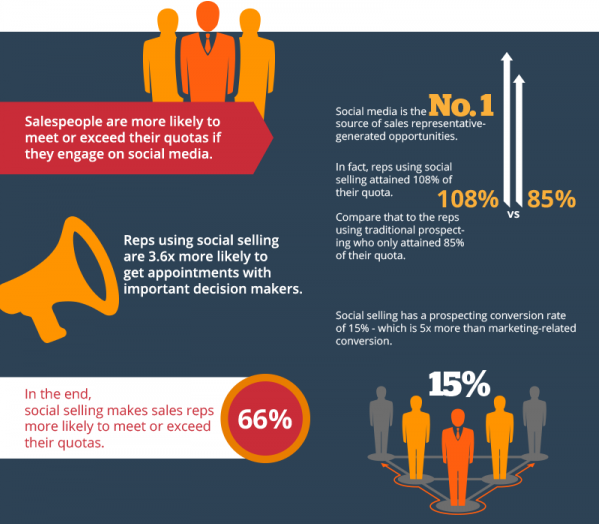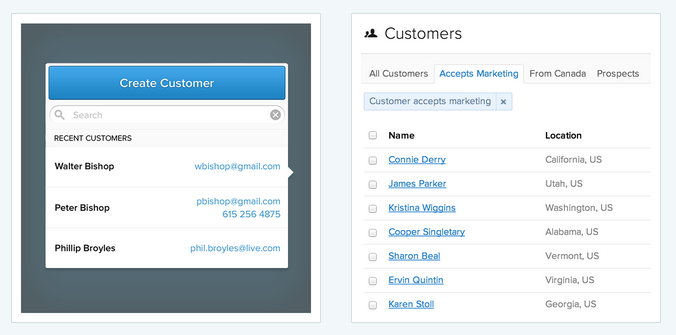4 min read
5 Tips to Keep in Mind Before Using Social CRM Software
Team Ambassador Jan 24, 2025 12:00:00 AM

5 Tips to Keep in Mind Before Using Social CRM Software
Once upon a time, businesses went out on a limb to embrace social media networks for sheer people power. There were obvious reasons for businesses to move to the social enterprise. Some of those benefits were loyalty, consumer support, brand building, awareness, and traction.
Social media, however, had more in store. As senior social marketing manager at LinkedIn Koka Sexton puts it, the rise of social selling is reality today.
According to the folks at Dynamic Signal, more than 85% of high-performing social sellers used social networks for networking. At least 78% of them use social networks for prospecting.
 Dynamic Signal – 2014: The Rise of Social Selling
Dynamic Signal – 2014: The Rise of Social Selling
The number of LinkedIn connections of a sales rep (or a business owner) directly correlates to meeting sales targets. For social selling, the average conversion rate is a whopping 15% (5 times more than normal marketing conversion rate).
CSO Insights research, in their annual survey of more than 4000 firms worldwide, reveals that social selling is now a competitive advantage. More than 57% (update since the survey results: that number is now 70%) of buyers complete their purchasing cycle even before engaging a vendor.
All that talk of social selling and social media power won’t be complete without the mention of social CRM (or at least CRM solutions that plug into social media). Here’s what you ought to know before you use a social CRM for your business:
Social Networks Are Not Marketplaces
Granted that more than half of the world is currently updating, sharing, posting, commenting, liking, and following as you read this. Social media is big and your buyers are lurking there. Yet, it’s not a marketplace. It’s not exactly a place where your buyers are looking to buy. It’s not the hustle pot. In fact, social media networks have low tolerance for sales.
Ironically, social selling is on the rise. How you ask? It’s all about relationships and conversation management. Just by “being there,” “establishing credibility,” and “willingly solving problems for free,” brands leverage the power of social selling.
If all this makes you think along the lines of “Pitch and grab the sale,” you’re mistaken. In fact, it’s like this:
“Don’t pitch. Just solve.”
“Don’t hustle. Deliver value and wait for the sale.”
“Don’t follow up. Give remote support and digital handshakes.”
When that handshake happens, however, your clients will find their way as entries into your social CRM.
From then on, it’s all about management of the relationship you just established.
Social CRM Software is About the People
For long, management gurus have advocated the importance of customers as living, breathing beings. They are not entries, ID numbers, or customer numbers; they are people. Social CRM solutions have this built into their dashboards.
You need to keep track of your customers’ social updates, and gather profile data such as birthdays, anniversaries and all those things that matter to them from these updates. Use the built-in features of your social CRM to help you keep track of this mind-numbing information about your customers. Social login and social sharing tools help you automate this. Ambassador too can help you manage campaigns and promotions using social data through a single dashboard.

While you do that, focus on the final goal: streamlining this rotating information exchange between your customers and your business, staff and vendors.
Social CRM Software Isn’t a Standalone Solution
There are enterprise-level CRM solutions, and then there are tools for small businesses that involve bits and pieces of social or CRM. Social CRM solutions came to the fore almost as an afterthought.
Yet, social CRM solutions are not standalone solutions. Either your CRM solution comes with social plugins (like Salesforce with Chatter) or the CRM is built from social-first approach (like Nimble CRM).
CRM solutions are not complete without the social part. Your CRM is not doing justice to customer relationships if it doesn’t have a social component to it. Amanda Nelson of Exact Target declared that relationship management has entered 21st century renaissance. She suggests basic onboarding for teams who have to deal with social media networks and get them used to the concept of social selling. In any case, social selling is best internalized when you lead by example.
Social CRM Software Only Does so Much
Using a social CRM isn’t going to guarantee you success. What it does guarantee are better processes, uniform information management, streamlined support for customers, and an unbreakable chain of effort to keep yourself updated when it comes to your customers.
According to this infographic by Numero, most of your customer interactions flowing into social CRM could start with requests to respond on issues, praise or feedback about service, or complaints.
The fact that at least 93% of Americans feel that companies fail to exceed customer service expectations makes a compelling case for social CRM adoption. With a CRM solution in place, you could very well grant yourself the opportunity to respond to customers faster and in a more efficient manner.
Social CRMs help tame the sales cycle
Whether you have a completely offline business model, a pure online business, or a hybrid of both, you’ll find that social CRM helps streamline customer data input.
With multiple touch points available for customers to interact with businesses today, it’s incredibly hard to track customer flow, let alone important metrics such as lifetime value of a customer or ROI. That is why some sort of CRM is being built into tools of all kinds, without explicitly defining it as such. For instance, ecommerce stores with a physical presence have started using mobile Point of Sale systems that incorporate reporting tools to track customers and sales made online or offline. This makes it easier for the retailer to spot trends and gain insights by grabbing data off random customer interactions and save data in a central database for the whole team to access.

Image source: Shopify POS
From a lead to a customer for life, you’ll be able to tame the sales cycle and be in control of the entire journey with the help of social CRM just by making sure that the data is accurate, updated, kept secure, and is made accessible on the cloud.
That, precisely, is the premise of a full-blown social CRM system.
Do you use social media for business? Is your use limited to engagement or do you also have a social selling strategy in place? We’d be happy to hear your thoughts!
Rohan Ayyar works at E2M, a premium digital marketing agency specializing in web analytics, creative content strategy, and conversion for startups. He is an avid blogger, with posts featured on MarketingProfs, Social Media Today and Entrepreneur, among other places. Rohan hangs out round the clock on Twitter @searchrook – follow him and hit him up any time for a quick chat.

